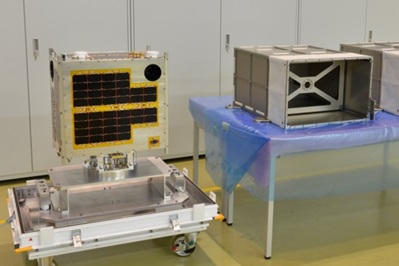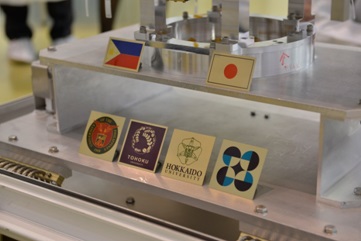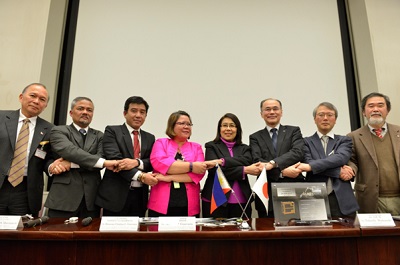This is an archive of information released in the past.
Disclaimer: It may contain broken links or outdated information. Some parts may not function in current web browsers.
*Visit https://humans-in-space.jaxa.jp/en/ for the latest information.

Experiment
- News
- Kibo Utilization Strategy
- Kibo Utilization Plan
- List of JAXA's Utilization Themes
- Experiment Facilities
- Space Environment Utilization
- Archive
The Philippines' 50-kg-class microsatellite "DIWATA-1" has been received. DIWATA-1 will be released from Kibo this spring.
On January 13, 2016, a 50-kg-class microsatellite called "DIWATA-1" (meaning "fairy" in Filipino) was handed over to JAXA. This satellite was co-developed by the Department of Science and Technology (DOST) of the Republic of Philippines, University of the Philippines, Hokkaido University, and Tohoku University.
The release of a 50-kg-class satellite using the JEM Small Satellite Orbital Deployer (J-SSOD) from the ISS Japanese Experiment Module ("Kibo") will mark the first time ever.
The Philippine government sponsored the development and launch of the satellite, while its deployment from Kibo will be conducted under a paid-utilization contract between JAXA and Tohoku University.
According to DOST, DIWATA-1 is the first microsatellite owned by the Philippine government involving Filipino engineers in its development. The satellite is intended to observe Earth, monitor climate changes, and develop human resources. Tohoku University and Hokkaido University each welcomed the reception of Filipino students and researchers. As such, DIWATA-1 was co-built in Japan by Japanese and Filipino engineers, whereas Tohoku University technically supported its satellite bus, and Hokkaido University supported the development of such payload as a mission sensor.
The most noteworthy feature of the DIWATA-1 mission is Japan's contribution to the Philippines' national project by offering the opportunity to use Kibo. While Japanese universities develop human resources through the development of hardware, as Japan is the only country in Asia participating in the ISS, JAXA offers an opportunity to demonstrate the mission in space to share part of the advances made in science and technology in the Philippines.
According to DOST, the Philippines is working to establish their own space agency toward the Asia-Pacific Regional Space Agency Forum (APRSAF) to be held later this year in the Philippines. Thus, this year will be memorable in terms of space development in the Philippines.
Prior to the press conference, a technological review was conducted on DIWATA-1.

Left: DIWATA-1 Right: satellite install case for J-SSOD 50-kg class

Logos of participating organizations
(From left, University of the Philippines, Tohoku University, Hokkaido University, Philippines Department of Science and Technology)
Having completed its final review, DIWATA-1 was housed in the satellite install case and shipped out to the United States on January 18.
After arriving in the U.S., DIWATA-1 will be delivered to NASA and launched by a U.S. commercial cargo vehicle. Its release from Kibo is scheduled by around May.
*All times are Japan Standard Time (JST)
| Copyright 2007 Japan Aerospace Exploration Agency | Site Policy |
